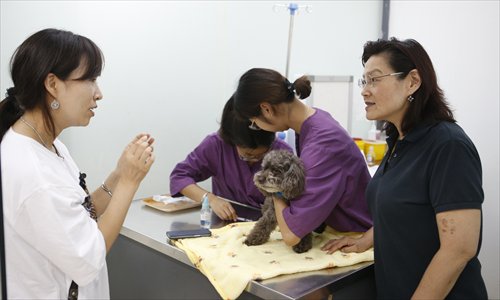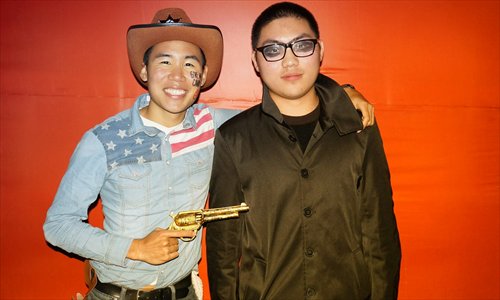Looks Chinese, acts American
Born and raised in the States but looking like a local, causes ‘yellow skin’ expats hardships in China

Chinese American Albert Chen, 25, said he came to China to discover his family roots and to build a start-up company using his engineering background. Photo: Courtesy of Albert Chen
The first day of every English class Jason Lee teaches at a university in the suburbs of Hangzhou in Zhejiang Province, he is met with awkward stares. His students step into the classroom and quickly appear puzzled, not taking their eyes off the young man with crew cut black hair, black eyes and yellow skin. "Is he the foreign teacher?" murmur the students.
"I am an American-born-Chinese (ABC)," Lee, 24, had to explain.
In 2015, Lee was among the growing number of foreigners flocking to China to work and experience the country. Yet ethnically, he is identified with a group of expats in China called huayi (foreign citizens of Chinese origin) who stand out from the rest due to their distinct Chinese heritage and family roots. They are also dubbed "banana people" - after peeling off the yellow cover, their white [Western] mindset is revealed - the result of being born and raised in the West. They look Chinese, but behave like an American.
As China continues to grow to be a global power, it's expected that the number of huayi coming to China to work and live will increase. Does their Chinese heritage make their path smoother in China? Metropolitan talks to several ABC who experienced transitioning in China.

Chinese American Mary Peng (far right) was among the earliest foreigners who came to do business in China in the 1990s. She believes ABC will go through the greatest cultural shock, and have a stronger sense of disappointment. Photo: Li Hao/GT
When an ABC teaches English
For most foreigners with English as a native language, teaching has always been the easiest way to start in China. Lee, a third-generation Chinese American, born and raised in Boston, decided to try it out, even though he majored in mechanical engineering and had no teaching experience.
"It's not a career, but a way to make money," Lee said. He came with three goals: to experience China, to learn the Chinese language, and possibly connect with his family roots.
Lee is a blogger for "ABC in China," in which he shares articles about cultural differences between China and the US. Being an ABC English teacher in China, he had to deal with local people's speculation on his identity because he appears to be Chinese.
"I also taught part time at a private English teaching school. There are times that parents were confused because I did not fit the typical characteristics of a Westerner," he said.
Eric Liu, a consultant at Foreign HR, a recruitment company for foreigners in China, said that foreigners with Chinese heritage may face more challenges while working as an English teacher.
"In the teaching industry, there are companies that explicitly claim they won't recruit ABC or other huayi. Europeans and Americans [without Chinese heritage] have a better advantage in getting a job in terms of their cultural backgrounds, foreign looks and purity of language," explained Liu.
But a lot of companies don't care if the applicants are huayi or not, according to Liu. Foreigners with Chinese heritage are preferred when some Chinese universities and enterprises hire international talent.
"For example, when a university is looking for a professor, foreigners with Chinese heritage are usually willing to work for a longer period of time. They may ask for a little lower pay, and are more likely to blend in with the local culture," said Liu.
One of the advantages of being an ABC English teacher in China is that they have a familiar look, which can be better for students.
"I met an English school owner who taught very young kids in Hangzhou, and she actually prefers hiring huayi. She feels that they understand Chinese culture a little bit more, and little kids are more comfortable with someone who looks the same," said Lee.
Still foreigners
Similar to Lee, Albert Chen, 25, has a degree in engineering, and before he came to China he was working in Silicon Valley in the US, home to many of the world's largest high-tech corporations and thousands of start-up companies. Currently, Chen is building a startup company.
"People respect you more if you're an ABC from the Silicon Valley," Chen said.
"As an American, I still had a Chinese heritage that I did not understand at all," he said, explaining this as one of his reasons for coming to China.
"I felt like I didn't have a strong connection with my family here. I wanted to come to China to see who they were and if there was something I could do for work with my engineering background. It's not about making money; it's about trying to see if I can contribute to society."
However, Chen said he did not feel his Chinese heritage granted him more benefits in terms of founding a start-up company in China.
"Many people have told me I don't understand Chinese culture. The government does not make it any easier for us to get visas or employment. Because we were born in the US, we are treated as foreigners," he explained.
In Chen's opinion, compared with huayi, the group of huaqiao (Chinese citizens residing abroad), are less likely to have language and culture barriers. For example, Chen could not register for a WeChat account for his business without borrowing a Chinese friend's ID card.
"How do you expect people like us to develop a startup when we are blocked from using basic means of advertising?" he added.

American born Chinese Jason Lee (left) said he came to China to experience the country. He was frustrated with not being recognized as American. Photo: Courtesy of Jason Lee
Bicultural people
For Carol Liu, a documentary producer and director who has lived in Beijing for almost six years, it is both a blessing and a curse to be a Chinese American.
Carol Liu was born into a Chinese family in Los Angeles. She has a bachelor's degree in English creative writing from Stanford University and a master's degree in film direction and writing from New York University. She was working at a production company as a freelance creative before coming to China. During her China stay, she produced and directed the documentary film Restoring the Light, featuring the work of a local humanitarian doctor in rural China.
In her opinion, ABC people can be faced with challenges when both people in China and the US are skeptical about their understanding of Chinese or American culture and professionalism.
Carol Liu said in China she was generally regarded as a Chinese person since she was raised with strict Chinese cultural practices. "Problems arise when Chinese people assume I am not American enough, for example, when someone defers to my blonde American friend for American business advice when I would have been more qualified to answer the question," she said.
On the other hand, she also met American people, from an American company, who deemed she was not Chinese enough because she speaks "such good American English," despite the fact that the person had never been to China before.
"It is ironic because it is precisely bicultural people like me who can better help build intercultural bridges because we are more aware of cultural differences," she said.
Due to health problems triggered by Beijing's environmental pollution, Carol Liu has returned to her home in the US. But she continues to work on projects related to China and said she plans to work in China again.
The sense of returning
Chinese American Mary Peng came to China after she graduated from Columbia University; she was among the earliest overseas business people who came to China in the early 1990s. She founded Beijing's International Center for Veterinary Services in 2006 and has stayed in China for almost two decades.
She remembered when telling her father, who emigrated to the US from China's Henan Province, that she was going to China to work, her father was upset because their family had to endure so many hardships to settle down in the US.
"I told him that there are more opportunities in China," she said.
Like many ABC, Peng said China is where she discovered how American she is, and that she just happens to have Chinese heritage.
"Chinese people use 'huijiale' (returning home) to describe all ethnic Chinese when they are in China," said Peng. "But with that also comes a tremendous amount of assumptions that the person can understand the culture and the language. It is extremely hard for us to meet these expectations."
Peng believes the number of Chinese Americans coming to China is rising. She suggests that ABC that are planning to come to China should keep an open mind during their stay.
"Don't assume that you will automatically understand Chinese culture," said Peng. In her opinion, Chinese Americans maybe the group that go through the greatest cultural shock, and have a greater sense of disappointment.
To become fairly fluent or functionally fluent in Chinese language is very important, said Peng. "Foreigners with Chinese heritage are expected to know a lot more mandarin than someone not ethnically Chinese. It might not be fair, but that is the reality that you face in China."
Lee left China at the end of July. Before returning to the US, he declined an offer from an international school based in Shanghai that pays quite well, and spent a while working as a freelance video editor in Thailand.
Lee concluded that his China stay was "challenging and humbling." He said his career goal is to become a digital nomad and it is possible he will come to China again, depending on factors such as pollution, the employer's internationalization standards and the scale of the foreign community of the Chinese city.
Huang Yiran contributed to this story